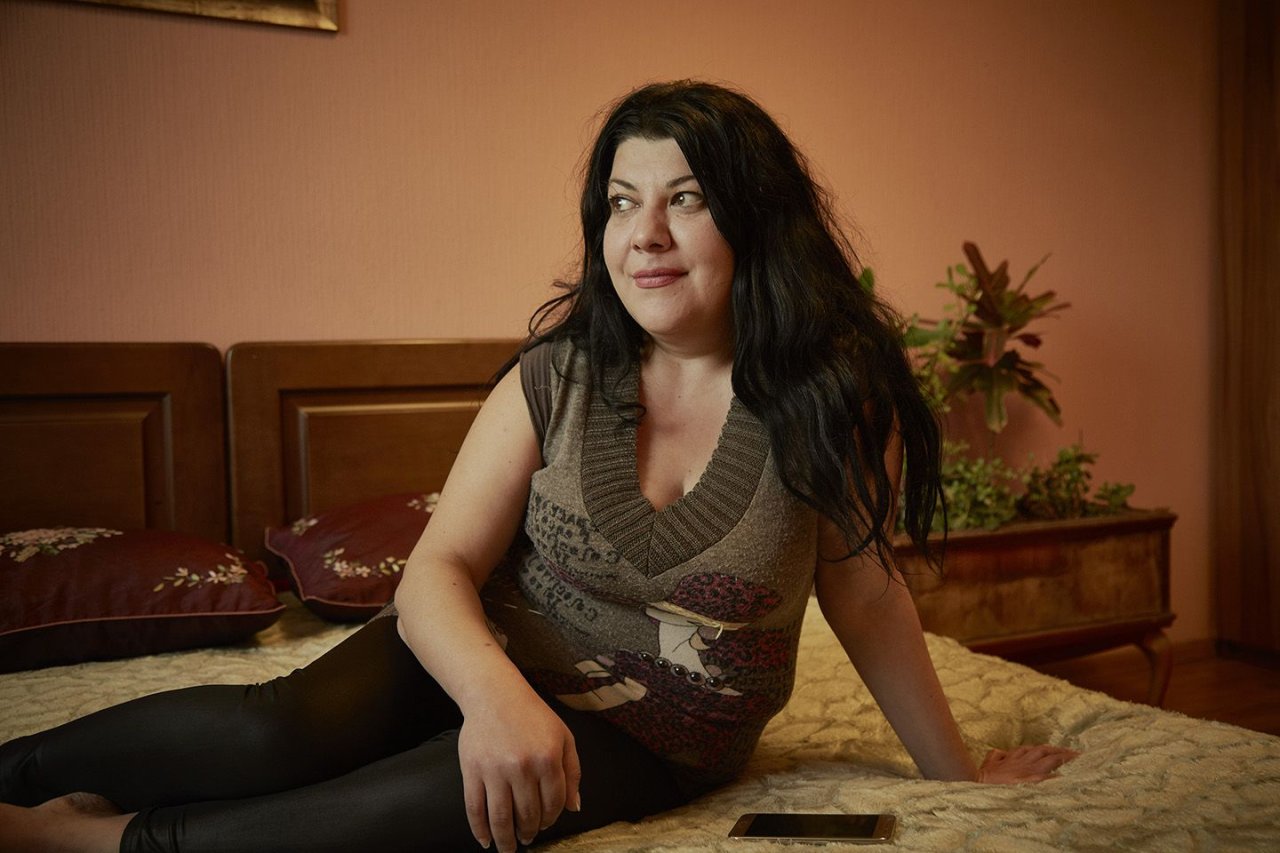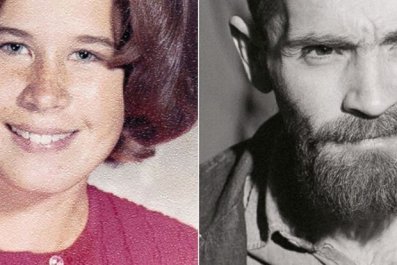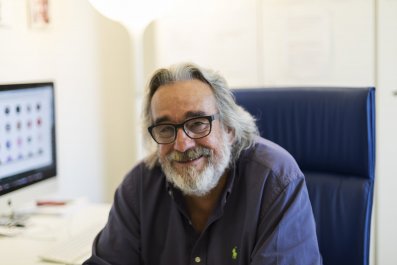The wolf saved Gayde Rizaeva from the rapists but could not protect her from the horror she was about to witness.
In July 2014, Rizaeva, a mother in her early 30s, was delivering supplies to Ukrainian forces in the country's restive east when she and three companions were captured by pro-Russian separatists. The militants seized the group—a journalist, a priest, Rizaeva and their driver—and took them to a nearby base, where they locked them up in a makeshift jail. Rizaeva—four months pregnant—says Chechen soldiers arrived and began beating the captives with their boots, fists and rifle butts. She says she was hit so hard that she miscarried.
As the men tossed her across the room, they noticed a tattoo of a wolf on her back. The animal is revered in Chechnya, and the men stopped attacking her. "They asked me if I was from Chechnya," says Rizaeva, a Crimean Tartar who had fled during Russia's annexation of her homeland in 2014. "I said no, but they respected me for having this she-wolf and being a Muslim woman."
They decided to spare her from further abuse, but Rizaeva says she was forced to watch her captors strip two male prisoners, beat them and then rape them with batons. "I kept fainting," she recalls. "But every time I came to, the attack was continuing."
Since it began more than three years ago, the war in eastern Ukraine has killed more than 10,000 people. Today, government forces continue to clash with Russian-backed separatists along a static front line, and Chechen troops loyal to Ramzan Kadyrov—the country's strongman leader and a close ally of Russian President Vladimir Putin—have fought alongside the latter.
The war has triggered sexual violence on both sides—and in almost all cases, no one is punishing the perpetrators. Survivors are gradually coming forward, offering evidence of abuse, forced prostitution, sexual slavery, mutilation and rape in secret detention centers on the front lines. Human rights monitors have recorded hundreds of cases of sexual violence and suspect many more go unreported due to fear of reprisals, cultural stigma, trauma and a weak justice system, among other reasons.
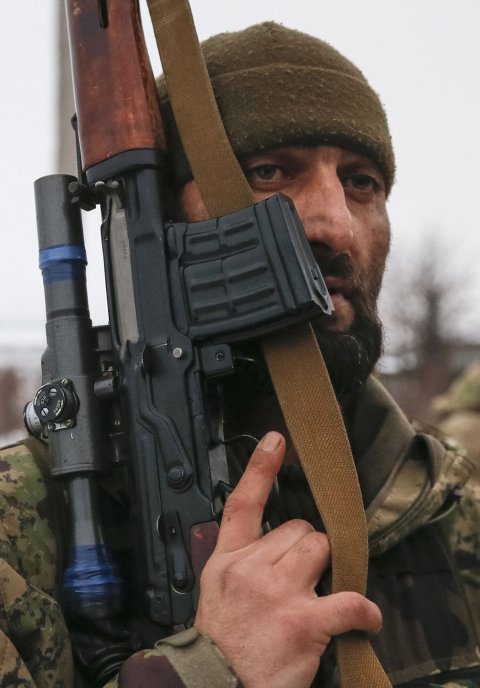
In breakaway territory loyal to Moscow, hundreds of thousands of civilians live under military dictatorship. It's a black hole for human rights where sexual violence can be used with impunity. And in territory held by the Ukrainian government, law enforcement authorities have conducted only a handful of faltering investigations. Critics say Kiev is failing to respect the rule of law and struggling to hold its own soldiers accountable.
In a report earlier this year, U.N. human rights monitors in eastern Ukraine identified "a pattern of sexual violence perpetrated in places of detention" to humiliate, punish, torture or extract confessions. Interrogators and guards on both sides have raped suspects and electrocuted their genitals. They've threatened to do the same to their relatives. In separatist-controlled territory, sexual violence has also been used to extort money and property.
Rizaeva was spared this brutal treatment. But during her capture in July 2014, she was kept in a cramped, overheated basement. Food and water were scarce; for a toilet, prisoners only had access to a bucket once a day. She says her male friends were raped again in their cells. After 98 days, her ordeal ended in late October when she and her friends were freed in a prisoner swap.
Human rights researchers disagree on the extent both sides have used sexual violence in eastern Ukraine as a weapon of war. The U.N.'s monitoring mission in the country says it has found no evidence of either side using it systematically for that purpose, though others argue that sexual violence has a strategic end. "This has been common practice towards detained persons and was encouraged by the pro-Russian side to establish effective control and suppress any manifestation of disobedience," says Olexsandr Pavlichenko, who co-authored " Unspoken Pain," a report on the issue produced by a coalition of human rights groups.
Russian-backed troops are not the only culprits. Testimonies collected by Amnesty International, Human Rights Watch and the U.N. show that the Security Service of Ukraine, or SBU, and pro-Ukrainian forces have trampled over the Geneva Conventions, abducting suspects and torturing them in secret prisons. In the spring of 2016, for example, U.N. monitors say eight masked individuals in camouflage arrested a suspected male separatist and took him to an abandoned building, where he was stripped and tied to a metal cage. One guard took a ramrod and inserted it into the prisoner's urethra; another filmed the torture on his phone. They beat him and threatened to upload the video to social media. Signing a confession and admitting his "guilt," the suspect was imprisoned.
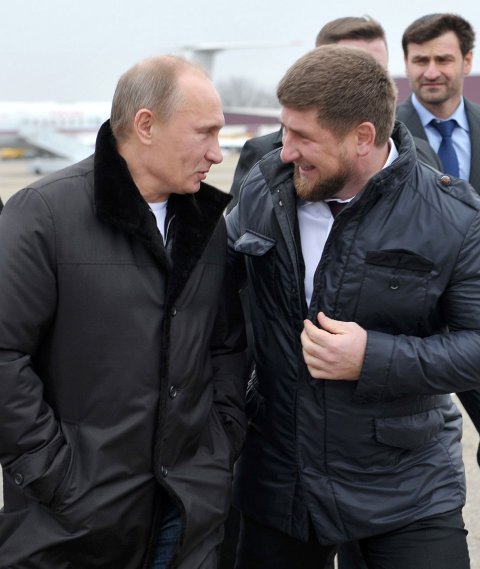
In a key test of Ukraine's justice system, a Kiev court in April imprisoned former members of the disbanded, pro-Ukrainian "Tornado battalion" for torturing and sexually assaulting civilians in the eastern Luhansk region in early 2015.
Generally, though, chances of prosecution are slim, and survivors complain of sluggish, ineffective police investigations. U.N. documents show that, by the end of 2016, Ukraine's Chief Military Prosecutor's Office had launched only three criminal proceedings that involved allegations of conflict-related sexual violence. The military prosecutor's office said all three cases have been closed due to lack of evidence but described allegations of impunity as "unjustified rumors." An SBU spokesperson declined to discuss specific allegations, saying that the agency acts "only under existing law."
As for Rizaeva, she's now 35 and living in a new home near Kiev. In the two years since her release, she has been helping coordinate prisoner exchanges. "You can go insane comparing your freedom to what you once had, locked within four walls. But I have a 16-year-old son, so I have to be strong. I believe that God saved me from death—it's my mission now to save as many people as I can."


